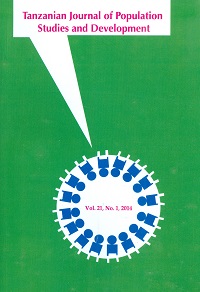Challenges Facing the Elderly in Tanzania
Abstract
This article assesses livelihood challenges facing the elderly in urban and rural settings in Tanzania. It is based on a study conducted in Morogoro Urban and Mvomero Districts in Morogoro Region in 2011. The study was based on the assumption that with the seemingly disintegrating traditional extended families and social support systems, the elderly are increasingly facing more livelihood challenges. The article examines the effect of ageing on the livelihood activities of the elderly in rural and urban areas, and identified the challenges they face. The data for the study was collected from 162 elderly people aged 60 years and above. It was found out that the majority of the elderly in the study area had no formal education, and with ageing, there has been a significant shift in their occupations. The very old are unable to work. The overall situation of vulnerability to poverty is critical in the rural areas. It is argued that the elderly face the following challenges: lack financial support; accessibility to health facilities; lack of respect and property security, and loneliness. The article concludes that the elderly are in a desperate livelihoods situation. It recommends that effective strategies be formulated in implementing the national ageing policy that was formulated in 2003. More important, there is the need to consider the possibility of an ageing pension to all elderly people in the country which, according to HelpAge International (2011), is within the capacity of the government of Tanzania.
References
Belcher, L. 2009. The Effects of Retirement. In eHow.com. Site visited on 10/9/2011.
Chimwaza, A., & S. Watkins. 2004. Giving Care to People with Symptoms of AIDS in Rural Sub-Saharan Africa. AIDS Care. 16( 7): 795-807.
Dayton, J. & M. Ainsworth. 2004. The Elderly and AIDS: Coping with the Impact of Adult Death in Tanzania. Social Science and Medicine. (10): 2161-72.
HelpAge International (HAI). 2002. Ageways: Practical Issues in Aging and Development, London: HelpAge International.
€”. 2011. A Study of Older People ' s Livelihoods in Tanzania, London: HelpAge International.
Knodel, J. 2006. Parents of Persons with AIDS: Unrecognised Contributions and Unmet Needs in Global Ageing: Issues and Action, in Population Reference Bureau, 6: 46-55.
Lerisse, F., D. Mmari, & M. Baruani. 2003. Vulnerability and Social Protection Programmes in Tanzania, in Study on Social Protection Programmes on Vulnerability. R & AWG.
Mbwana, E. and J. Kivelia. 2010. Assessment of Traditional Practices Aggravating Maternal Mortality in Temeke District, Tanzania. Tanzanian Journal of Population Studies and Delelopment. 17(1&2): 17 €“33.
Merli, G.M. & A. Palloni. 2006. The HIV/AIDS Epidemic, Kin Relations, Living Arrangements, and the African Elderly in South Africa. Washington, D. C: National Academies Press.
National Bureau of Statistics, & Macro. 2000. Tanzania Reproductive and Child Health Survey (TRCHS), Planning Commission Dar es Salaam and Demographic and Health Surveys. Macro International Inc.
€”. 2005. Tanzania Demographic and Health Survey (TDHS) 2004/05, Planning Commission Dar es Salaam and Demographic and Health Surveys.
Macro International Inc. 2009. Household Budget Survey 2007 €“ Tanzania Mainland. in HBS_2007_Report_Final_ Document_6 May_2009.
Population Reference Bureau (PRB). 2007. Today ' s Research on Aging. No. 6 August 2007.
Shaw, K. 2011. Emotional Effects of Retirement. in eHow.com. Site visited on 10/9/2011.
URT. 2003. The National Policy on the Ageing. The Ministry of Labour, Youth Development and Sports, Dar es Salaam.
€”. 2005. 2002 Population and Housing Census, Village and Street Statistics, Age and Sex Distribution €“ Morogoro Region. Vol. VII.


